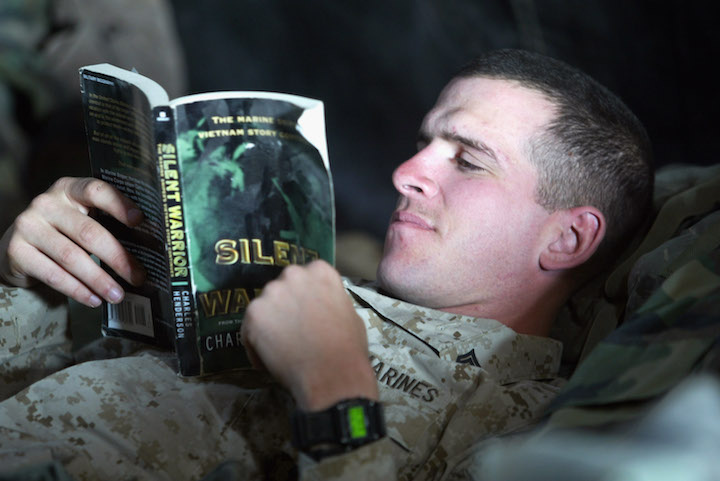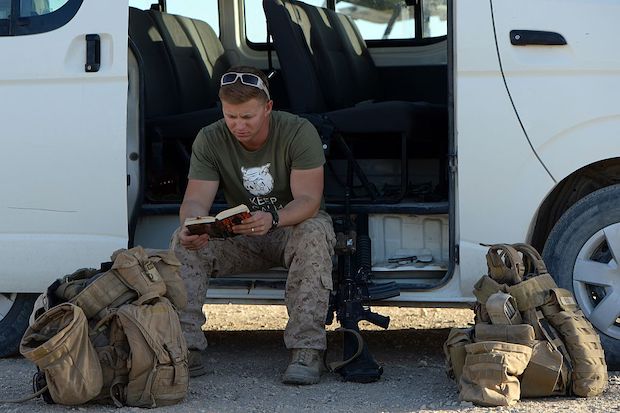The Art of War Sun Tzu Commandants Reading List
in: Living, Reading
• Nov 11, 2021
The All-time of the Marine Corps' Reading Lists

From aboriginal times til the present, the ideal warrior has been celebrated as a man of both thought and action, with a mind as finely honed as his sword. Since the 19th century, the Marine Corps has directed its members to pursue that ideal by issuing a list of recommended reading to members of its fighting force. In 1989, the reading list was codified, and since then, each commandant (the highest-ranking officer in the Corps) has put out the "Commandant'south Professional Reading List" each yr. The goal of the listing is to better Marines' understanding of their profession, the nature of war, and the broader world, and develop their decision-making skills, desire for lifelong learning, and power to wrestle with issues. The books are to exist read by enlisted personnel and officers alike, with commanders encouraged to discuss the books with their men.
In the reading list issued in 2005, four-star full general and commandant Michael Due west. Hagee shared the criteria by which the books were selected for recommendation:
A. THE LIST DOES NOT Comprise FLEETING TRENDS.
B. IT EMPHASIZES WARFIGHTING.
C. IT IS HISTORICALLY BASED.
D. Information technology USES SERIOUS LITERATURE THAT HAS AN ESTABLISHED PERMANENCE.
E. It ENCOMPASSES A Broad CONTEXT.
F. AND, It IS ACHIEVABLE By ALL MARINES.

In 2012, Commandant James F. Amos sent a letter of the alphabet to the Corps which reiterated that "the development and broadening of the mind is a critical attribute of the truthful warrior's preparation for battle" and argued that the source of the "adaptation and flexibility shown by Marines faced with a variety of different situations and challenges" could be traced to this delivery to intellectual growth. Amos expressed business concern over the fact that many Marines of the time had dropped the reading habit — in part because of the pressures and time constraints generated by over a decade of continuous gainsay in Iraq and Transitional islamic state of afghanistan — and called for a reemphasis on reading throughout the Corps:
Faced with a menstruum of fiscal austerity and an uncertain globe, it's more important now than ever before to dedicate time to read and to recollect. As we prepare ourselves for whatever is to come, the study of military history offers the inexpensive chance to learn from the difficult-won experience of others, observe a template for solving existing challenges, and avoid making the same mistakes twice. . . . Any book thoughtfully read sharpens the mind and improves on an individual's professional potential.
Whatever has caused our emphasis on reading to cloudburst, nosotros as Marines and every bit leaders, need to restore its preeminence at every level. . . .
Commanders and senior enlisted volition reinvigorate the critical emphasis on reading in their units and develop a unit reading program. Books will be selected for reading and discussion, with time set up aside in the schedule to that end. . . .
Reading is a critical continuing activity. Nosotros need to detect the time for it but every bit we find time weekly for individual and unit physical conditioning. What I am calling for is nothing less than a renewal of a disquisitional aspect of our delivery to the profession of arms.
The Commandant'due south Professional Reading Lists included a set of books designated equally the "Commandant's Choice" — favorites he felt were pertinent to all Marines — besides equally sets of recommended books broken down by rank, e.g., an enlisted private was given a unlike listing of books to read than a second lieutenant. All Marines were required to read a certain number of books from the Commandant's Choice list and/or their "Grade Level" list. Once a Marine had read all the books assigned to his class, he could continue reading upwardly the list.
While there are a few books that made information technology into almost every edition of the CPRL, every few years the list is revised, with books added and taken away from the line-upwards based on the commandant'south personal picks, the feedback of rank-and-file Marines, and the want to create a list of books which speaks to the electric current centers of conflict and particular issues of a menses. So, for example, books well-nigh dealing with PTSD and the way technology is changing warfare have been added in the terminal decade, while books that covered the history of the Corps, merely just up through the 20th century, were replaced with more upwardly-to-date publications.

In recent years, the list got a little "lighter" in heft, with fewer entries on history and logistics, the elimination of classic books on strategy past Sun Tzu and Clausewitz, and the improver of popular psychology books like Malcom Gladwell's Outliers and modern novels like Set Player One. But overall, the CPRL maintained a solid mix of books on leadership, tactics, and martial history.
Then in 2020, the Commandant's Professional Reading List underwent a more than significant overhaul. The CPRL was simplified to a single list for all Marines, regardless of rank, and organized into five categories (Foundational Documents, Profession of Arms, Innovation, Leadership, and Strategy). Its entries were revised with the official aim of ensuring the listing "remains relevant, current, and promotes professional discussions amid all Marines." To that finish, many historical and biographical books which had been included on about every CPRL of the last thirty years went missing (including must-reads like With the Old Brood), books focused on female Marines and emotional intelligence (due east.g., Dare to Lead by Brene Dark-brown) were added, and the number of popular psychology books was increased overall. The fiction selections (like the formerly perennial inclusion of classics such as In one case an Hawkeye and All Placidity on the Western Front, likewise equally modern page-turners like Steven Pressfield'south Gates of Burn), which always comprised a smaller but still meaning portion of each CPRL, were reduced to a single graphic novel.
As with many things, change isn't always an unmitigated good, and the past CPRLs were arguably much superior in content, depth, and range. Beneath we highlight 36 of the best books from all the Commandant's Professional Reading Lists that were issued from 1989 until 2019 (you can find all the previous Marine Corps' reading lists hither), nearly all of which we've read ourselves and can personally recommend. Whether you're armed services or civilian, perhaps you'll meet a few you'd like to add together to your own to-read list. Equally Full general Amos put it, in all life'south battles, "mental preparation [is] as of import as physical conditioning."
Noteworthy Entries on the Marine Corps Commandant's Professional Reading List (1989-2019)
- "A Bulletin to Garcia" by Elbert Hubbard
- With the Erstwhile Breed at Peleliu and Okinawa by Eastward.B Sledge
- Fields of Fire by James Webb
- The Carmine Badge of Courage by Stephen Crane
- Company Commander by Charles MacDonald
- The Face up of Boxing past John Keegan
- The Mask of Command past John Keegan
- The Art of State of war by Sunday Tzu
- Strategy past B.H. Liddell Hart
- The Beefcake of Backbone by C.Northward. Moran
- The Claiming of Command: Reading for Military Excellence past Roger Nye
- All Quiet on the Western Front by Erich Maria Remarque
- The Killer Angels by Michael Shaara
- Attacks past Erwin Rommel
- Once an Hawkeye by Anton Myrer
- War and Peace by Leo Tolstoy
- On War past Carl von Clausewitz
- The Supreme Commander: The War Years of General Dwight D. Eisenhower by Stephen E. Ambrose
- Band of Brothers by Stephen East. Ambrose
- Starship Troopers by Robert A. Heinlein
- The Centurions by Jean Larteguy
- Rifleman Dodd by C.Southward. Forester
- The General past C. South. Forester
- American Caesar: Douglas MacArthur, 1880-1964 by William Manchester
- Boxing Cry of Liberty: The Ceremonious War Era past James Grand. McPherson
- Thinking in Time: The Uses of History for Decision Makers by Richard Eastward. Neustadt and Ernest R. May
- Nineteen Stars: A Report in Military machine Grapheme and Leadership by Edgar F. Puryear
- Ender's Game by Orson Scott Card
- Marine! The Life of Chesty Puller by Shush Davis
- Gates of Burn past Steven Pressfield
- The Warrior Ethos by Steven Pressfield
- History of the Peloponnesian War by Thucydides
- Patton: A Genius for War by Carlo D'Este
- Boyd: The Fighter Pilot Who Changed the Fine art of War past Robert Coram
- Black Swan: The Impact of the Highly Improbable by Nassim Taleb
- Left of Bang: How the Marine Corps' Combat Hunter Program Can Salve Your Life by Patrick Van Horne and Jason A. Riley
Tags: Books
Previous Side by side
Source: https://www.artofmanliness.com/living/reading/the-best-of-the-marine-corps-reading-lists/